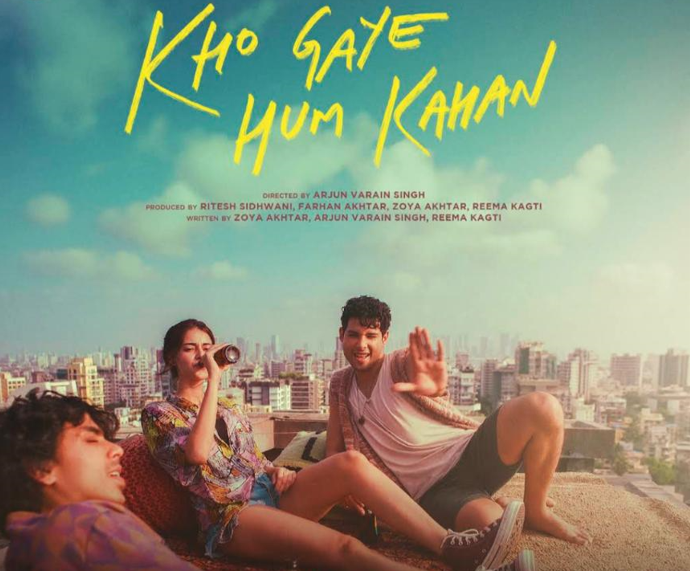Netflix’s ‘Kho Gaye Hum Kahan’ shows the perils of a social media-obsessed world
Netflix’s ‘Kho Gaye Hum Kahan’ shows the perils of a social media-obsessed world

January 12, 2024 | New Delhi | Netflix’s “Kho Gaye Hum Kahan” revolves around three long-time friends—Ahana, Imaad, and Neil—who share a strong bond since their school days.
Each has their own struggles: Imaad (Siddhant Chaturvedi), a stand-up comedian, strives to improve his craft and secure better opportunities. Ahana (Ananya Panday,) works in a corporate job where she is seen as someone who lacks recognition. Neil (Adarsh Gourav), a gym trainer, dreams of owning his gym but feels unsatisfied with his life’s direction.
The common thread among them is their entrapment in the digital world, where they aren’t true to themselves.
Imaad’s caught up in casual dating via a fake Tinder account, guarded against forming meaningful relationships. Neil, eager for fame, hurries through life, reveling in brief moments of recognition such as training Malaika Arora and dating an influencer, unaware of the superficiality of his relationships.
The Netflix film underscores how today’s youth are consumed by the digital façade, forgetting to live authentically. Ahana, after breaking up with Rohan, obsesses over his new relationship, seeking validation through Instagram posts and ignoring real-life connections. She is seen frustrated by Rohan’s “super happy life and perfect girlfriend”. This addiction to the digital world reflects the film’s central theme.
Director Arjun Varain Singh’s debut streaming film holds a mirror to this generation’s reliance on the digital realm. Mumbai acts as the perfect backdrop as it highlights the city’s fast-paced yet isolating nature, where people struggle with emotions and communication, mirroring Imaad’s inability to open up. In the movie, Imaad visits a psychiatrist who explains that he’s built a wall around himself, avoiding relationships and keeping everyone out. It’s like he’s hiding from his true self and isn’t ready to open up.
Neil gets caught up in seeking fame and doesn’t notice his relationship isn’t genuine. His girlfriend isn’t really into him and stops seeing him when she finds someone who fits her desires better. Also, the influencer he dates calls herself Lala, but her real name is Laxami Lalvani, showing how people feel ashamed to share their true selves in today’s digital world. It’s similar to Imaad, who uses the name Zeeshan on Tinder, not being entirely honest about who he is. Neil’s frustration with his parents’ simplistic lifestyle further illustrates the disconnect prevalent in society.
“Kho Gaye Hum Kahan” starts bright and bubbly, mirroring the idealized versions of ourselves we curate online. But the true brilliance lies in its descent into the darker shades of real life, where friendships fray, love falters, and insecurities bubble over. This shift forces us to confront the hollowness behind the filtered feeds, and the messy reality of navigating adulthood in the digital age. While showcasing friendship, love, and trust is heartwarming, the film cleverly subverts these by weaving in fights, betrayals, and the uncomfortable truths that lurk beneath the surface. This complexity resonates with viewers because it reflects the multifaceted nature of our relationships and the constant push-and-pull between ideals and reality.
Though the film effectively conveys its intended message, it falls short of perfection. While its themes echo those found in previous coming-of-age films like “Dil Chahta Hai” and “Zindagi Na Milegi Dobara,” rendering it relatable, the lack of originality dims its shine. The film grapples with pacing issues, alternating between drawn-out scenes and rushed pivotal moments. Despite its attempt to underscore the significance of real-life connections versus digital engagement in the climax, the execution feels somewhat forced and overly simplistic. It might not be groundbreaking, but it’s a valuable addition to the conversation about the joys and pitfalls of navigating identity, connection, and self-discovery in the digital age.


